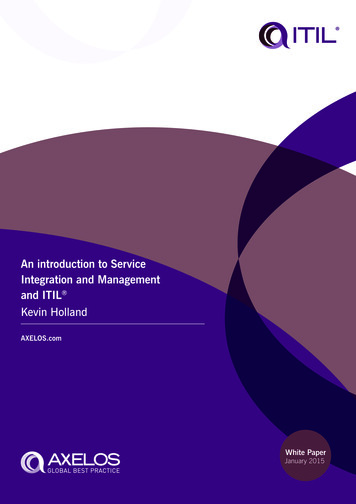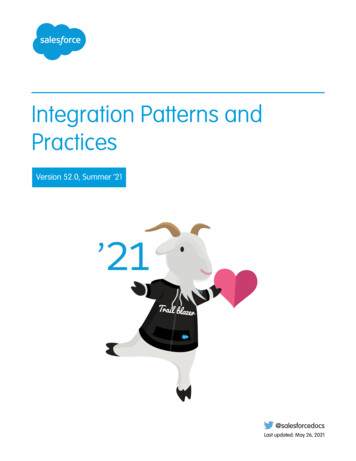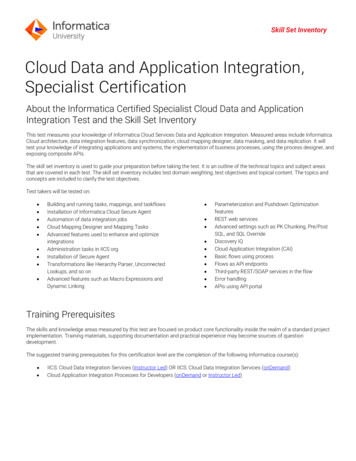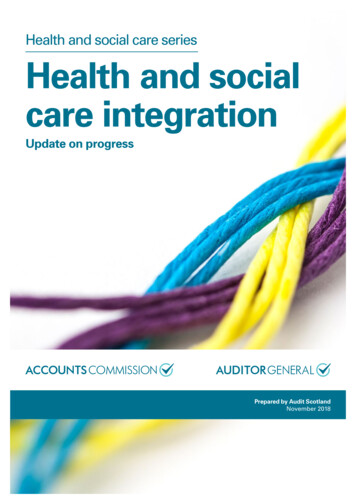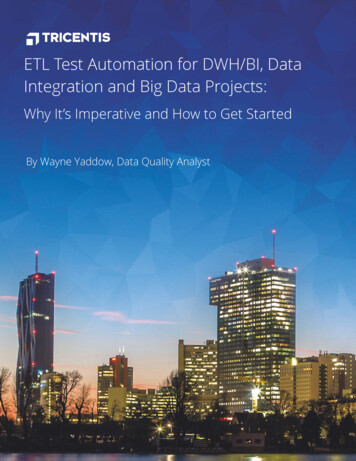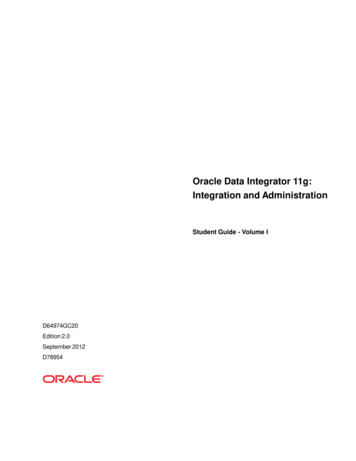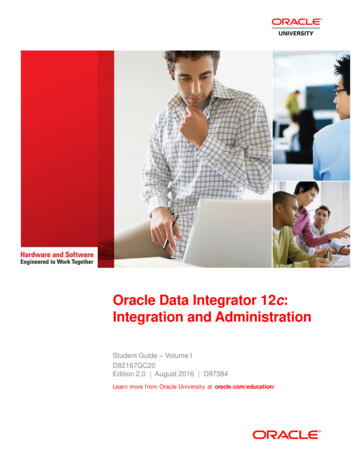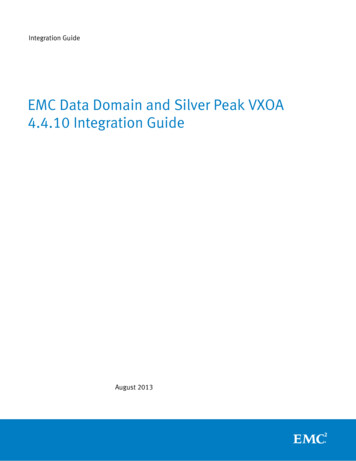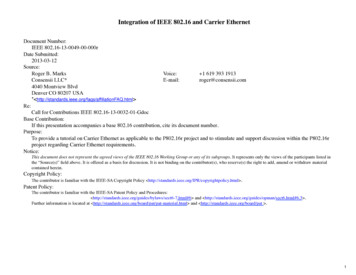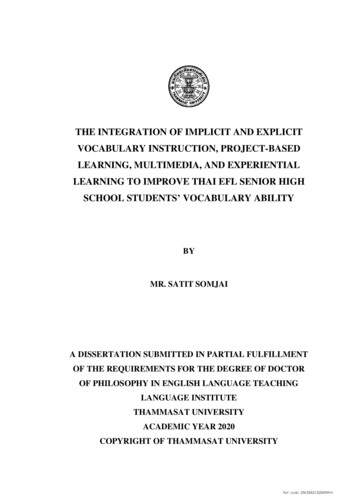
Transcription
(1)THE INTEGRATION OF IMPLICIT AND EXPLICITVOCABULARY INSTRUCTION, PROJECT-BASEDLEARNING, MULTIMEDIA, AND EXPERIENTIALLEARNING TO IMPROVE THAI EFL SENIOR HIGHSCHOOL STUDENTS’ VOCABULARY ABILITYBYMR. SATIT SOMJAIA DISSERTATION SUBMITTED IN PARTIAL FULFILLMENTOF THE REQUIREMENTS FOR THE DEGREE OF DOCTOROF PHILOSOPHY IN ENGLISH LANGUAGE TEACHINGLANGUAGE INSTITUTETHAMMASAT UNIVERSITYACADEMIC YEAR 2020COPYRIGHT OF THAMMASAT UNIVERSITYRef. code: 25635821320099AHI
(2)THE INTEGRATION OF IMPLICIT AND EXPLICITVOCABULARY INSTRUCTION, PROJECT-BASEDLEARNING, MULTIMEDIA, AND EXPERIENTIALLEARNING TO IMPROVE THAI EFL SENIOR HIGHSCHOOL STUDENTS’ VOCABULARY ABILITYBYMR. SATIT SOMJAIA DISSERTATION SUBMITTED IN PARTIAL FULFILLMENTOF THE REQUIREMENTS FOR THE DEGREE OF DOCTOROF PHILOSOPHY IN ENGLISH LANGUAGE TEACHINGLANGUAGE INSTITUTETHAMMASAT UNIVERSITYACADEMIC YEAR 2020COPYRIGHT OF THAMMASAT UNIVERSITYRef. code: 25635821320099AHI
THAMMASAT UNIVERSITYLANGUAGEINSTITUTEDISSERTATIONBYMRoSATIT SOMJAIENTITLEDTHE NTEGRATION OFIMPLICIT AND EXPLICIT VOCABULARYNSTRUCTION,PROJECT― BASED LEARNNG,MULTIM[EDIA,ANDEXPERIENTIAL LEARNNG TO IMPROVE THAIEFL SENIOR HIGH SCHOOLSTUDENTS'VOCABULARY ABILITYwas a7pproved as partial fulf11lment ofthe requirements forthe degrec ofDoctor ofPhilosophy(English Language Tcaching)on June 26,2020ChairProfessor Supong Tangkiengsirisin, Ph.D.)Member and AdvisorKittitouch Soontornwipast, Ed.D.)Member,Ph.D。 )Member(Assi stant P;ofessor PattamaSappapan. Ph. D. )Memberfessor Virasuda Sribayak, Ph.D.)Director{l t-ssocibte Profbssor Supong Tangkiengsirisin, Ph.D.)
(1)Dissertation TitleTHE INTEGRATION OF IMPLICIT ANDEXPLICIT VOCABULARY INSTRUCTION,PROJECT-BASED LEARNING,MULTIMEDIA, AND EXPERIENTIALLEARNING TO IMPROVE THAI EFLSENIOR HIGH SCHOOL STUDENTS’VOCABULARY ABILITYAuthorMr. Satit SomjaiDegreeDoctor of PhilosophyMajor Field/Faculty/UniversityEnglish Language TeachingLanguage InstituteThammasat UniversityDissertation AdvisorAssistant Professor KittitouchSoontornwipast, Ed.D.Academic Year2020ABSTRACTThis study was conducted to investigate the impacts of the integration ofimplicit and explicit vocabulary instruction, project-based learning, multimedia, andexperiential learning on improving Thai EFL senior high school students‟ vocabularyability and to explore their perceptions of the instruction. The study involved 45 tenthgrade senior high school students at a public high school in Thailand. They were thelowest and were academically among the weakest students within the tenth grade. Theimpacts of the intervention were assessed with the participants‟ pre- and post-tests andthe perceptions of the participants were obtained from their reflective journals (SRJ),the students‟ perception questionnaire, and semi-structured focus group interviews.The findings revealed that all students‟ test scores significantly improved andconfirmed that the integration of implicit and explicit vocabulary instruction, projectbased learning, multimedia, and experiential learning enhanced the students‟knowledge of vocabulary ability. The qualitative results indicated that all 45 studentshad positive perceptions of the instruction. Furthermore, it was revealed that most ofRef. code: 25635821320099AHI
(2)the students reflected that this instruction was very useful and practical. They reportedthat it helped them to memorize new vocabulary faster and more easily, increasedtheir self-confidence, improved their speaking skills, created a pleasant atmospherefor study, provided them with the opportunity to participate in classroom activities,and encouraged them to use various kinds of technology. In order to effectivelyimplement the techniques used in this study, teachers need to be creative, patient,resourceful, open-minded, and flexible since the aim of this course is to inspirestudents to create their own projects, multimedia PowerPoint presentations, and toteach their friends in the classroom. Therefore, the role of the teacher in this course isto give advice, help students solve problems, boost the students‘ critical thinking, andto support students‘ work in groups efficiently.Keywords: vocabulary ability, vocabulary instruction, project-based learning,multimedia, experiential learningRef. code: 25635821320099AHI
(3)ACKNOWLEDGEMENTSSince I was born, I always have had a dream to study at the highest levelor to study in a Ph.D. program. My family always encouraged me to realize theimportance of education as it is one of the tools that leads me to be successful in life,to take care of myself and my family, and to help others and in our society.Learning and developing my English skills are what I have been doingthroughout my life. Pursuing a Ph.D. at Thammasat University is another thing thathas helped to fulfill my childhood dreams.I have improved myself in all areas, both in academic proficiency inEnglish language teaching and social skills development. I have had a great chance tomeet many exceptional lecturers and classmates who are excellent in English and inEnglish language teaching. This has opened up to me a new world of Englishteaching.Without the encouragement, supervision, and advice from the followingpeople, this journey would have not been achievable.Importantly, I would like to express my heartfelt gratitude to the mostexceptionally supportive supervisor a Ph.D. student could ever wish for, AssistantProfessor Dr. Kittitouch Soontornwipast. I would like to thank him for his moral andacademic support from the very beginning to the end of this journey. He is akindhearted teacher who always motivated and encouraged me to fight for thisjourney whenever I felt discouraged.Furthermore, I would like to thank my thesis committee, AssociateProfessor Dr. Supong Tangkiengsirisin, Associate Professor Dr. SureepongPhothongsunan, Assistant Professor Dr. Pattama Sappapan, and Assistant ProfessorDr. Virasuda Sribayak, for their invaluable academic guidance in completing thisthesis. Also, I would like to thank all of the experts who helped to validate all of theinstruments pertaining to conducting this research. My warmest thanks are alsoextended to Mrs. Wanwisa Pripol, head of the department of foreign languages, andMiss Jantamas Timto, my helpful colleague, for supporting and helping me tocomplete this thesis. Moreover, I would like to thank all of my students at BodindechaRef. code: 25635821320099AHI
(4)(Sing Singhaseni) School who participated in this study for their kind assistance,patience, and understanding.My heartfelt thanks also go to my family, my parents, and my elder sister.They understood and encouraged me during my studies at Thammasat University. Iwould also like to thank all of my colleagues, the English teachers at Bodindecha(Sing Singhaseni) School, who always and support me with understanding.Ref. code: 25635821320099AHI
(5)TABLE OF CONTENTSPageABSTRACT(1)ACKNOWLEDGEMENTS(3)LIST OF TABLES(12)LIST OF FIGURES(13)LIST OF ABBREVIATIONS(14)CHAPTER 1 INTRODUCTION AND PROBLEM STATEMENT11.1 Problems of Teaching English in Thailand11.1.1 Lack of Qualified Teachers21.1.2 Learners’ Problems31.2 The Importance of Vocabulary61.3 The Factors Contributing to Low Achievements In9Vocabulary Learning and Teaching Thai Students1.4 Research Purpose181.5 Research Questions181.6 Scope of the Study181.7 Definition of Terms191.7.1 Experiential Learning191.7.2 Implicit and Explicit Vocabulary Instruction191.7.3 Multimedia191.7.4 Project-Based Learning201.7.5 Senior High School Students201.7.6 Students‘ Perception201.7.7 The Integration of Implicit and Explicit Vocabulary20Ref. code: 25635821320099AHI
(6)Instruction, Project- Based Learning, Multimedia,And Experiential Learning1.7.8 Vocabulary Ability201.7.9 Vocabulary Projects201.8 Significance of the Study201.9 Organization of the Study21CHAPTER 2 REVIEW OF THE LITERATURE222.1 Vocabulary Ability and Vocabulary Learning Strategies222.1.1 Significance of Vocabulary in Terms of Language Learning 222.1.2 Receptive Vocabulary Knowledge vs. Productive23Vocabulary Knowledge2.1.3 L2 Vocabulary Learning – Implicit vs. Explicit Learning242.1.3.1 Implicit Learning of Vocabulary242.1.3.2 Explicit Learning of Vocabulary262.1.4 Vocabulary Learning Strategies272.1.5 Four Essential Components of Vocabulary Instruction31Used in This Study2.1.5.1 Providing Rich and Varied Language Experiences312.1.5.2 Teaching Individual Words Explicitly322.1.5.3 Teaching Word-Learning Strategies332.1.5.4 Fostering Word Consciousness332.2 Project-Based Learning342.2.1. Origin of Project-Based Learning342.2.2 Definition of Project-Based Learning352.2.3 Basic Features of Project-Based Learning362.2.4 Components of PBL372.2.5 Project-Based Learning Framework in This Study382.2.5.1 First Stage: Planning392.2.5.2 Second Stage: Researching392.2.5.3 Third Stage: First Draft39Ref. code: 25635821320099AHI
(7)2.2.5.4 Fourth Stage: Rewriting402.2.5.5 Fifth Stage: Submitting the Project402.3 Multimedia412.3.1 Theoretical Basis of Multimedia English Instruction412.3.1.1 Constructivism422.3.1.2 Cognitive Psychology432.3.2 Elements of Multimedia432.3.2.1 Text442.3.2.2 Audio442.3.2.3 Video442.3.2.4 Graphics452.3.2.5 Animation452.3.3 Multimedia in Motivating the Learner‘s Interest in46English Language Learning2.3.3.1 To Provide Abundant Information472.3.3.2 To Stimulate Students’ Attention and Interest472.3.3.3 To Promote Self-regulating Learning472.3.3.4 To Promote Transcultural Communication482.3.3.5 To Promote Interaction between Teacher48and Student2.3.3.6 To Improve The Efficiency of Teachers2.4 Experiential Learning48492.4.1 Experiential Learning Theory492.4.2 Why Experiential Learning?502.4.3 Characteristics of Experiential Learning532.4.4 Experience and Language Learning542.4.5 Kolb's Experiential Learning Cycle552.4.6 Instructor and Student's Roles in Experiential Learning572.4.7 The Learning Pyramid592.4.7.1 Lecture612.4.7.2 Reading612.4.7.3 Audio-visual62Ref. code: 25635821320099AHI
(8)2.4.7.4 Demonstration622.4.7.5 Discussion622.4.7.6 Practice by Doing622.4.7.7 Teaching Others632.5 Previous Empirical Studies2.5.1 Previous Research on Implicit and Explicit Vocabulary6565Instruction2.5.2 Previous Research on Project-Based Learning and67Vocabulary2.5.3 Previous Research on Multimedia and Vocabulary672.5.4 Previous Research on Experiential Learning and68English and Vocabulary TeachingCHAPTER 3 METHODOLOGY703.1 Research Design703.2 The School Setting733.2.1 English Courses 1-6733.3 Research Population and Samples753.4 Instrumentation753.4.1 Pre-Test and Post-Test for Vocabulary Ability763.4.2 Students‘ Perception Questionnaire813.4.3 Lesson Plans for the Integration of Implicit and Explicit82Vocabulary Instruction, Project-Based Learning,Multimedia, and Experiential Learning forTheoretical Frameworks of This Study3.4.4 Semi-Structured Focus Group Interviews873.4.5 Students‘ Reflective Journal (SRJ)883.5 Data Collection Procedure903.6 Data Analysis933.6.1 The Analysis of the Quantitative Data94Ref. code: 25635821320099AHI
(9)3.6.1.1 Vocabulary Ability Scores on the Pre-test94and Post-test3.6.2 The Analysis of the Qualitative Data943.6.2.1 Students‘ Reflective Journals943.6.2.2 Students‘ Perception Questionnaire953.6.2.3 Semi-Structured Focus Group Interviews953.7 Ethical Considerations for Conducting the Study97CHAPTER 4 FINDINGS994.1 Impacts of the Integration of Implicit and Explicit Vocabulary99Instruction, Project-Based Learning, Multimedia, andExperiential Learning on Improving Thai EFL SeniorHigh School Students‘ Vocabulary Ability4.1.1 Pre-Test and Post-Test of Vocabulary Ability994.2 Students’ Perceptions of The Integration of Implicit And103Explicit Vocabulary Instruction, Project-Based Learning,Multimedia, And Experiential Learning4.2.1 Data on The Students‘ Perceptions from The103Reflective Journals4.2.1.1 Reflection on Project-Based Learning Steps1044.2.1.2 Reflection on Their Own Vocabulary Lesson1134.2.1.3 Reflection on their peers‘ vocabulary lessons1204.2.2 Data on Students’ Perceptions from the Perception125Questionnaire4.2.3 Data on Students’ Perceptions from The Semi-Structured135Focus Rroup InterviewsCHAPTER 5 DISCUSSION AND CONCLUSION1495.1 Summary of the Study1495.2 Summary of the Findings151Ref. code: 25635821320099AHI
(10)5.3 Discussion and Implications of The Integration of Implicit151And Explicit Vocabulary Instruction, Project-BasedLearning, Multimedia, And Experiential Learningon The Students’ Vocabulary Ability5.3.1 The Improvement in The Students' Vocabulary Ability1525.3.2 Perception of The Integration of Implicit and Explicit153Vocabulary Instruction, Project-Based Learning,Multimedia, and Experiential Learning Regarding TheStudents’ Vocabulary Ability5.3.2.1 Perceiving the course to be useful1535.3.2.2 Most Practical and Outstanding Techniques1575.4 Implications of the Study1645.5 Limitations of the Study1665.6 Recommendations for Future Research166REFERENCES168APPENDICES189Appendix AThe Pre-Tests and Post-Tests on Vocabulary190Ability and the Writing Scoring RubricsAppendix BThe Evaluation Form for the Pre- and Post-Tests and201Scoring RubricsAppendix CStudents’ Reflective Journal (SRJ)208Appendix DThe Evaluation Form for the Students’ Reflective Journal211Appendix EStudents’ Perception Questionnaire toward212English Course 1Appendix FThe Evaluation Form for the Students‘ Perception216QuestionnaireAppendix GSemi-structured Focus Group Interview Questions218Appendix HThe Evaluation Form for the Focus Group Interview219QuestionsAppendix ILesson Plans220Ref. code: 25635821320099AHI
(11)Appendix JThe Evaluation Form for the Lesson Plans242Appendix KSamples of Students‘ Vocabulary Projects243Appendix LConsent Form274BIOGRAPHY276Ref. code: 25635821320099AHI
(12)LIST OF TABLESTablesPage1.1 ONET English Scores 2014-201751.2 EF English Proficiency Index61.3 Summary of the factors contributing to the low achievements16in vocabulary learning and the teaching of Thai students and prop
school students ¶vocabulary ability by mr satit somjai a dissertation submitted in partial fulfillment of the requirements for the degree of doctor of philosophy in english language teaching language institute thammasat university academic year 20 20 copyright of thammasat university ref. code: 25635821320099ahi 2 the integration of implicit and explicit vocabulary instruction, project -based .
